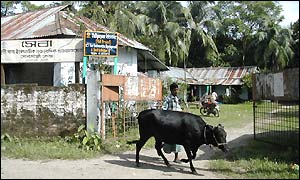| NEWS | SPORT | WEATHER | WORLD SERVICE | A-Z INDEX | ||||||||
|
| You are in: Technology | |||||||||||||||||||||||||||||||||||||||||||||||||||||||||||||||||||||||||||||||||||||||||||||||||||||||||||||||||||||||||||||||||||||||||||||||||||||||||||||||||||
|
Sunday, 6 October, 2002, 11:32 GMT 12:32 UK
New horizons for Bangladeshi doctors

The telecentre in Sonagazi is the first of 300 planned
The country has one of the highest maternal and infant mortality rates in Asia, as some doctors have little knowledge about women's health. "For rural doctors it is hard to close their clinics and come to a city centre for the courses. This is why they don't come to update their knowledge," explained Dr Abu Jamil Faisal of EngenderHealth, which promotes healthcare for women. The organisation is one of the partners in a grand project to set up more than 300 telecentres across rural Bangladesh to educate doctors in the latest medical advances. 'Textbooks too expensive' But persuading the medical profession to adopt new technology could prove a uphill struggle.
The centre has two computers and a library of CD-Roms packed with medical information. The aim is to get doctors in rural areas to drop in and use the discs for research. "The computer is the right tool as we can offer all these resources on CD-Rom," said project co-ordinator Shahid Uddin Akbar of the Information Communication Technology Development Programme Bangladesh. "Textbooks are too expensive for local doctors. If we have the CD-Rom with lots of journals and articles, we can disseminate it anywhere." Lack of knowledge In theory, doctors say they are interested in the project. "We are working in a rural area so we are devoid of an information technology programme or any such knowledge," said Dr Nurallah during a visit to the telecentre.
Despite his initial enthusiasm, Doctor Nurallah admitted he uses his computer at home rather the machines at the telecentre. Health experts say part of the problem is that rural doctors are hesitant about publicly showing their lack of knowledge. Doctors fear that their reputation and standing in the local community could be harmed if they are seen learning how to work a computer at a telecentre. Official rewards Another is simply a fear of technology. "There is a lot of interest, even among the older doctors," said EngenderHealth's Dr Faisal.
The backers of the project believe the answer may lie in offering private training sessions in secret for doctors, so they can learn how to use computers and the internet. But perhaps the greatest obstacle is that the courses on offer are not recognised by the Bangladeshi Medical Council. This means doctors are reluctant to spend time doing a course or studying a CD-Rom as they do not receive an official certificate at the end of it. The organisers are aware of the problem and are talking with the medical authorities about gaining official recognition. They hope that by continuing the medical education of doctors, they will be able to raise the standard of healthcare across the Bangladesh.
|
See also:
28 Feb 00 | South Asia
16 Aug 02 | Country profiles
06 Oct 02 | Technology
Internet links:
The BBC is not responsible for the content of external internet sites Top Technology stories now:
Links to more Technology stories are at the foot of the page.
|
|||||||||||||||||||||||||||||||||||||||||||||||||||||||||||||||||||||||||||||||||||||||||||||||||||||||||||||||||||||||||||||||||||||||||||||||||||||||||||||||||
|
Links to more Technology stories |
 |
|
|||
| ----------------------------------------------------------------------------------
To BBC Sport>> | To BBC Weather>> | To BBC World Service>> ---------------------------------------------------------------------------------- © MMIII | News Sources | Privacy |